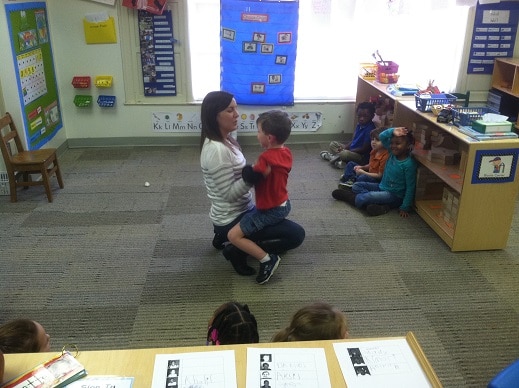Most education researchers and even many economists think high-quality Pre-K benefits children and the communities where they live. But the effects are limited when programs just don’t reach many kids. In Part Three of the Southern Education Desk series on Pre-K in the Deep South, Dan Carsen has more from right here in Alabama, which has a highly regarded program that reaches a just a fraction of the state’s four-year-olds.
When it comes to enrollment rates, neither the South nor the U.S. is anywhere near “universal Pre-K.” Only eight states provide it to more than half their four-year-olds. Georgia is one of them, but in neighboring Alabama, just six percent of eligible kids are enrolled in state-funded Pre-K. Ironically, as the New York Times recently noted, Alabama also has one of the country’s best programs.
OK. Good program, little access. But what does that look like on the ground?
Four-year-old Aksil Bouriche, a lucky “six-percenter,” spends his days at the downtown Birmingham YWCA’s Pre-K program, which serves homeless families, working professionals, and everyone in between for almost 12 hours a day. Aksil says he likes learning math by counting bears, and he gets to do it in groups, which teaches him how to take turns and share.
Aksil’s mom, Valerie, says the program has been good for him and his friends: “They’re learning letters. They’re learning sounds. It’s helping them to get ready for reading. They’re getting an interest in learning. They’re definitely getting an interest in math skills and understanding those building blocks.”
She says it’s also been good for her whole family. “Unfortunately, I’m not able to stay at home, so it works for us.”
I ask her what she’d do if the program weren’t available to her family. She seems troubled by the thought.
“Well,” she says, pausing a few moments, “… either they would be in a second-rate childcare facility, or I would not be working and we would just be making it on one income. It would be a lot harder.”
Most experts agree and go even further. University of Alabama at Birmingham early education specialist Kay Emfinger says kids who attend Pre-K are more likely to graduate high school and go to college, “and they’re less likely to be incarcerated, to be on a social welfare program, or to be held back in school … Not having your child prepared when they enter kindergarten can obviously put them on an unequal footing with children who have had a Pre-K experience. There are lots of people who do not have options, and there’s a huge wait list.”
Birmingham parent Stephanie Berry knows all about it. She has two associate’s degrees and just landed a new job, and she really wants to get her son Cameron into Pre-K. But, she says, “he’s on a waiting list right now … you don’t know if he’s going to get picked. So I’m in between … I’m a single mom, trying to work, and it’s kinda hard. It’s kinda scary. You think you’re getting somewhere, but then it’s like a closed door. And I really don’t want him to wait. I want him to be prepared.”
Stephanie Berry and her son Cameron at home. Photo by Dan Carsen.
Berry and Alabama Pre-K administrators say parents often don’t know about the state’s 215 sites. That’s partly because people tend to learn of them through word-of-mouth, and that’s partly because the sites don’t advertise because there are already more kids than spots.
Also, several rural counties in Alabama don’t have a single state-approved program. And there are other obstacles: fees, which are usually but not always modest; lack of transportation; and guardians’ work schedules. Then there’s the fact that high quality means fewer students per teacher, which adds to the waiting lists parents like Berry know so well.
But Dr. Emfinger says statewide, a lack of high-quality teachers is not the main hurdle, because “we do have the infrastructure to provide the quality of teachers that we need. Our colleges are producing enough early-childhood professionals.”
So it really does come down to funding. Which comes down to priorities. Which, for better or worse, comes down to politics and perception. Regardless of what states like Alabama do, and regardless of the reasons, when it comes to Pre-K, right now, there are millions of children who’d benefit but just can’t snag a spot.

